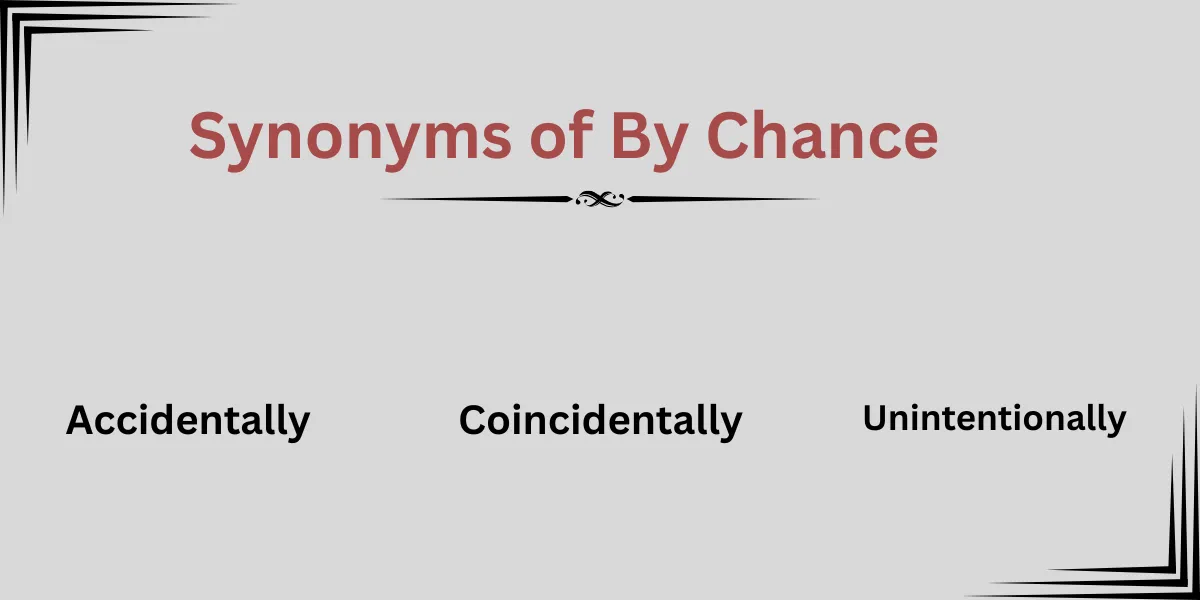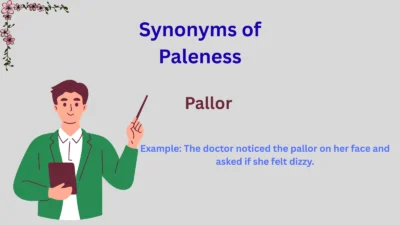Synonyms of by chance, such as accidentally, randomly, and unintentionally, describe things that happen without planning or control. For example, you might meet a friend by chance at the mall or discover something new accidentally while searching for something else. These phrases capture life’s surprises—moments that simply happen without design.
If you’re writing about luck, coincidence, or unexpected events, using the right synonym for by chance can make your sentences sound more natural and vivid.
In this guide, you’ll learn the meaning and example sentence for each synonym of by chance, so you can describe unplanned moments with clarity and charm.
What Does By Chance Mean?
By chance means something happens without planning, intention, or control. It often describes lucky discoveries, random events, or unexpected meetings that just “happen.”
Depending on how it’s used, by chance can express:
- Luck or fortune — something good happening unexpectedly
- Coincidence — two unrelated things occurring together
- Accident — something happening without purpose or design
- Surprise — an outcome no one expected
At its heart, by chance reminds us that not everything in life is planned. Sometimes, the best moments come when we least expect them.
30 Synonyms for “By Chance” (With Meanings, Examples, and Usage Tips)
1. Accidentally
Meaning: Without intention; not planned.
Example: “He accidentally deleted the entire file.”
When to Use: Best for unintentional mistakes or neutral mishaps—not for positive coincidences.
2. Coincidentally
Meaning: Happening at the same time by coincidence.
Example: “We coincidentally booked the same hotel in Rome.”
When to Use: Use when events align unexpectedly, especially in storytelling or conversation.
3. Fortuitously
Meaning: Happening by chance, often with a fortunate outcome.
Example: “She fortuitously found a seat on the crowded train.”
When to Use: Great for formal writing and situations where luck plays a role.
4. Serendipitously
Meaning: Happening by chance in a happy or beneficial way.
Example: “They met serendipitously during a rainstorm and became best friends.”
When to Use: Ideal for romantic, lucky, or heartwarming coincidences.
5. Unintentionally
Meaning: Without conscious intent or planning.
Example: “He unintentionally hurt her feelings.”
When to Use: Best when you want to stress innocence or lack of purpose behind an action.
6. Randomly
Meaning: Without order, purpose, or pattern.
Example: “Names were randomly selected for the raffle.”
When to Use: Perfect for processes, data, or impartial selections—less emotional, more objective.
7. Inadvertently
Meaning: Done carelessly or without realizing.
Example: “She inadvertently left her bag on the train.”
When to Use: Best in formal or apologetic contexts—shows lack of intent without carelessness.
8. Unexpectedly
Meaning: Happening suddenly and not anticipated.
Example: “He unexpectedly ran into his teacher at the concert.”
When to Use: When something surprising or unplanned occurs—often neutral or positive.
9. Casually
Meaning: Without serious intent or planning.
Example: “They casually met at a friend’s gathering.”
When to Use: Good for light or informal situations—suggests relaxed spontaneity.
10. Haphazardly
Meaning: Without order or careful planning.
Example: “The files were haphazardly stacked on his desk.”
When to Use: Use for disorganized or careless actions, not coincidences.
11. Arbitrarily
Meaning: Based on random choice rather than reason.
Example: “The teams were divided arbitrarily.”
When to Use: For systemic randomness or impartial decision-making—often formal or technical.
12. Incidentally
Meaning: Occurring as a minor or secondary part of something else.
Example: “He incidentally mentioned her name in the conversation.”
When to Use: Perfect when something happens as a side effect, not as the main focus.
13. Unknowingly
Meaning: Without realizing or being aware.
Example: “She unknowingly offended her boss.”
When to Use: Use when someone does something unintended due to lack of awareness.
14. Impulsively
Meaning: Done without forethought or planning.
Example: “He impulsively booked a flight to Japan.”
When to Use: Highlights sudden emotion or spontaneity, often personal or emotional.
15. Spontaneously
Meaning: Happening naturally, without external cause or planning.
Example: “The crowd spontaneously started singing.”
When to Use: For energetic or heartfelt moments that arise naturally.
16. Unplanned
Meaning: Not arranged or prepared beforehand.
Example: “Their unplanned road trip became their favorite memory.”
When to Use: Fits both casual and sentimental tones—neutral in meaning.
17. On a Whim
Meaning: Because of a sudden idea or impulse.
Example: “She moved to Paris on a whim.”
When to Use: Perfect for personal decisions made spontaneously—playful or romantic tone.
18. Out of the Blue
Meaning: Suddenly and without warning.
Example: “He called me out of the blue after ten years.”
When to Use: Common in conversational English for unexpected events.
19. Without Intention
Meaning: Not done on purpose.
Example: “He spoke harshly without intention to offend.”
When to Use: Similar to unintentionally, but slightly more formal or reflective.
20. Without Design
Meaning: Without a deliberate plan or structure.
Example: “The events unfolded without design.”
When to Use: Use in literary or historical writing—elevated tone.
21. By Accident
Meaning: Without meaning to; unintentionally.
Example: “She spilled coffee by accident.”
When to Use: Very close to “by chance,” but used for mistakes rather than coincidences.
22. Purely by Luck
Meaning: Solely due to good fortune.
Example: “He found the lost key purely by luck.”
When to Use: Best for lucky or improbable situations.
23. By Coincidence
Meaning: Due to two unrelated events aligning.
Example: “We both wore red shirts by coincidence.”
When to Use: Neutral tone—works well in both writing and speech.
24. By Fortune
Meaning: Through the influence of luck or fate.
Example: “By fortune, they escaped the storm unharmed.”
When to Use: Sounds literary or poetic—great for formal storytelling.
25. Unpremeditatedly
Meaning: Without prior thought or planning.
Example: “He spoke unpremeditatedly, straight from the heart.”
When to Use: Use in academic or reflective writing—rare but expressive.
26. By Happenstance
Meaning: By chance or coincidence.
Example: “They met by happenstance during a layover.”
When to Use: Slightly formal and old-fashioned, perfect for essays or narratives.
27. At Random
Meaning: Without a plan, order, or reason.
Example: “The seats were assigned at random.”
When to Use: Use for objective or procedural randomness, not emotions.
28. Unplannedly
Meaning: Without being arranged or organized ahead of time.
Example: “They met unplannedly after years apart.”
When to Use: Grammatically rare, but acceptable in creative or descriptive writing.
29. Without Warning
Meaning: Suddenly and unexpectedly.
Example: “The storm hit without warning.”
When to Use: For sudden or surprising events—adds intensity.
30. By Fluke
Meaning: Because of a stroke of luck or an odd chance.
Example: “He passed the exam by fluke.”
When to Use: Common in British English, often for unexpected success.
How to Choose the Right Synonym for “By Chance”
Choosing the right synonym depends on your tone, context, and emotion:
| Tone/Context | Best Synonyms | Examples |
| Positive/Lucky | Serendipitously, Fortuitously, Purely by luck, By fortune | “They met serendipitously during the holidays.” |
| Neutral/Descriptive | Coincidentally, By happenstance, By coincidence | “They were seated together by happenstance.” |
| Negative/Accidental | Accidentally, Unintentionally, By accident | “He accidentally broke the glass.” |
| Spontaneous/Emotional | On a whim, Impulsively, Spontaneously | “She impulsively joined the road trip.” |
| Formal/Academic | On a whim, impulsively, spontaneously | “The outcome occurred fortuitously.” |
Cultural and Emotional Nuances
- British vs. American English:
“By fluke” is common in British English, while Americans prefer “by luck” or “by coincidence.” - Emotional depth:
“Serendipitously” and “spontaneously” often carry warm or romantic undertones, while “inadvertently” feels apologetic. - Formality:
“Fortuitously” or “by happenstance” sound elevated, while “out of the blue” or “on a whim” are casual and conversational.
Conclusion:
Synonyms of by chance, such as accidentally, coincidentally, and fortuitously, highlight events that happen unexpectedly or without planning. Each word adds a different shade—accidentally shows unintended outcomes, coincidentally emphasizes surprising timing, and fortuitously suggests lucky or favorable results.
Using these synonyms lets you describe surprises, luck, and unplanned moments with precision and variety. They remind us that life is full of unexpected twists, chance encounters, and moments that happen without warning but leave a lasting impact.




